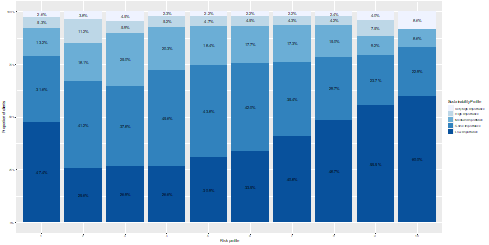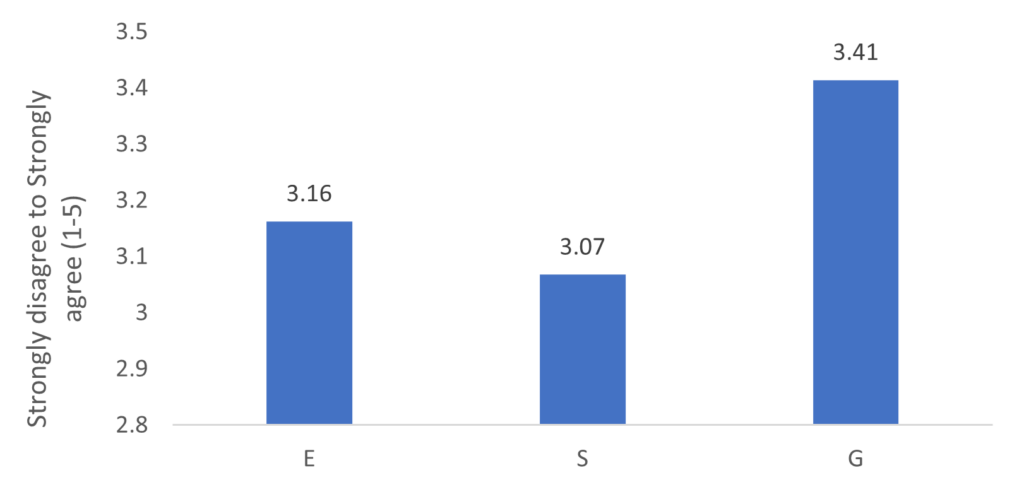Dynamic Planner, the UK’s leading digital financial planning and advice platform, has analysed the data* of almost 17,500 advised investors views on the importance of sustainability.
As COP 28 gets underway, Dynamic Planner has found that while investing sustainably remains an important factor, as willingness to take risk increases the importance of sustainability reduces. The analysis showed that of those investors in risk profile 10, Dynamic Planner’s highest risk level, 6 out of 10 viewed sustainability as of low importance **

Chart showing the relationship between an investors risk (1-10) and sustainability (low to very high profiles)
Dynamic Planner also found that a larger proportion of men (39%) than women (26%) view sustainability as something of low importance, while (32%) of women view sustainability as of medium to very high importance compared to men (21%).
The stereotype that younger clients have a greater preference for sustainable investments due to supposedly being more values-driven and having a greater desire to seek investments that align with their views were not borne out in the analysis, with no apparent differences across any of the age groups.
In terms of which aspect of sustainability is held in highest regard, more investors said the ‘G’ of ESG is a priority as it means investments help companies treat all stakeholders fairly. Even a proportion of around 70% of investors who consider sustainability to be of low or some importance, agree with this statement, 17% and 51% respectively. Surprisingly fewer placed as much importance on ‘E’ – that investments help to improve the environment. The ‘S’ – that their investments should help improve people’s living conditions was the lowest priority of the three ESG factors. However, of those who view sustainability as of high and very high importance, a higher percentage strongly agreed that it is priority to help improve the environment, compared to improving living conditions and treating stakeholders fairly.

Chart showing importance placed on ESG statements
Louis Williams, Head of Psychology and Behavioural Insights at Dynamic Planner, said: “Our analysis paints a nuanced picture of attitudes towards investing sustainably and ESG factors. Events like COP28 which bring the world together to focus on issues such as climate action have ensured that many people understand the importance of acting in a sustainable way. However, using the power of their investments to shape the world for the better is perhaps limited for some due to the greater focus on trying to achieve a better return.
“We have found those investors who are more comfortable with increased financial risk are prepared to invest in market opportunities that go beyond the realms of companies that act in a sustainable or ESG risk managed way. This may be because climate change and risks of stranded assets have not yet been properly understood or their appetite for not missing out on certain market sector returns is still the overriding motivation. There also may well be some investors who want their fund managers to engage (by remaining invested) to bring about change.”
* Research has been undertaken using data from Dynamic Planner’s sustainability questionnaire, an industry first when it was launched in 2021 and created by the team behind the UK’s leading risk profiling process. A client’s sustainability preference is profiled on a scale, like their attitude to risk, providing you with a foundation for a conversation and enabling you to match it with solutions with ESG ratings available to research in Dynamic Planner.
Dynamic Planner also offers clients access to independent and whole of market ESG research of more than 32,000 funds. Guard against greenwashing and trust that the research is objective and is rigorously completed by a 200-strong team of analysts at MSCI, a world leader in the field which has been doing it longer than anyone else.
** Risk Profile 10 – Likely to contain very-high-risk investments such as emerging market shares and a small amount in high-risk investments such as shares in UK and overseas developed markets.


